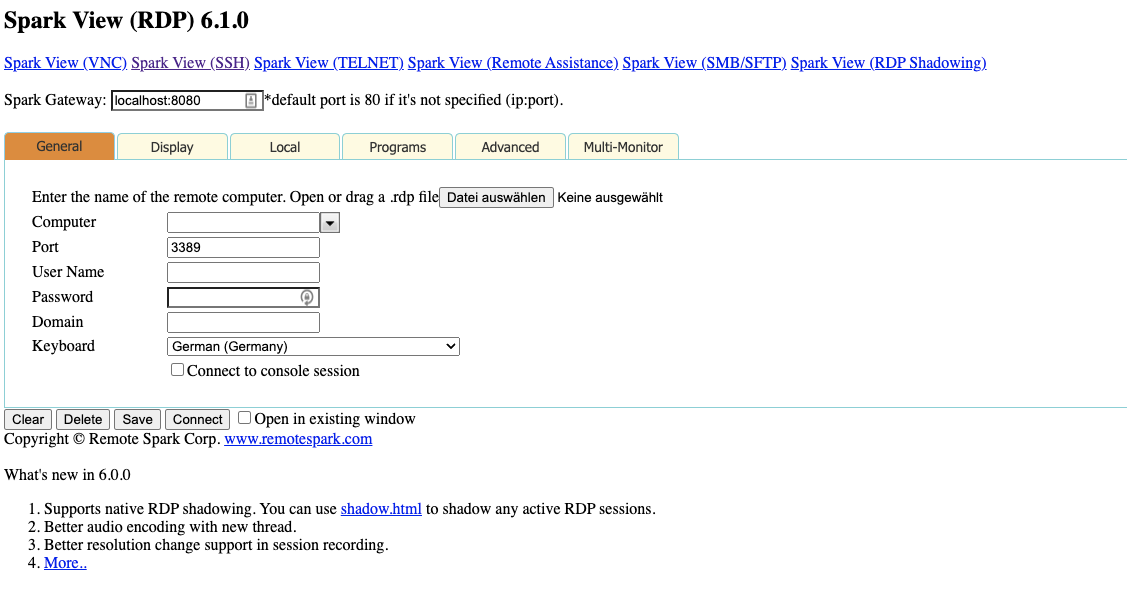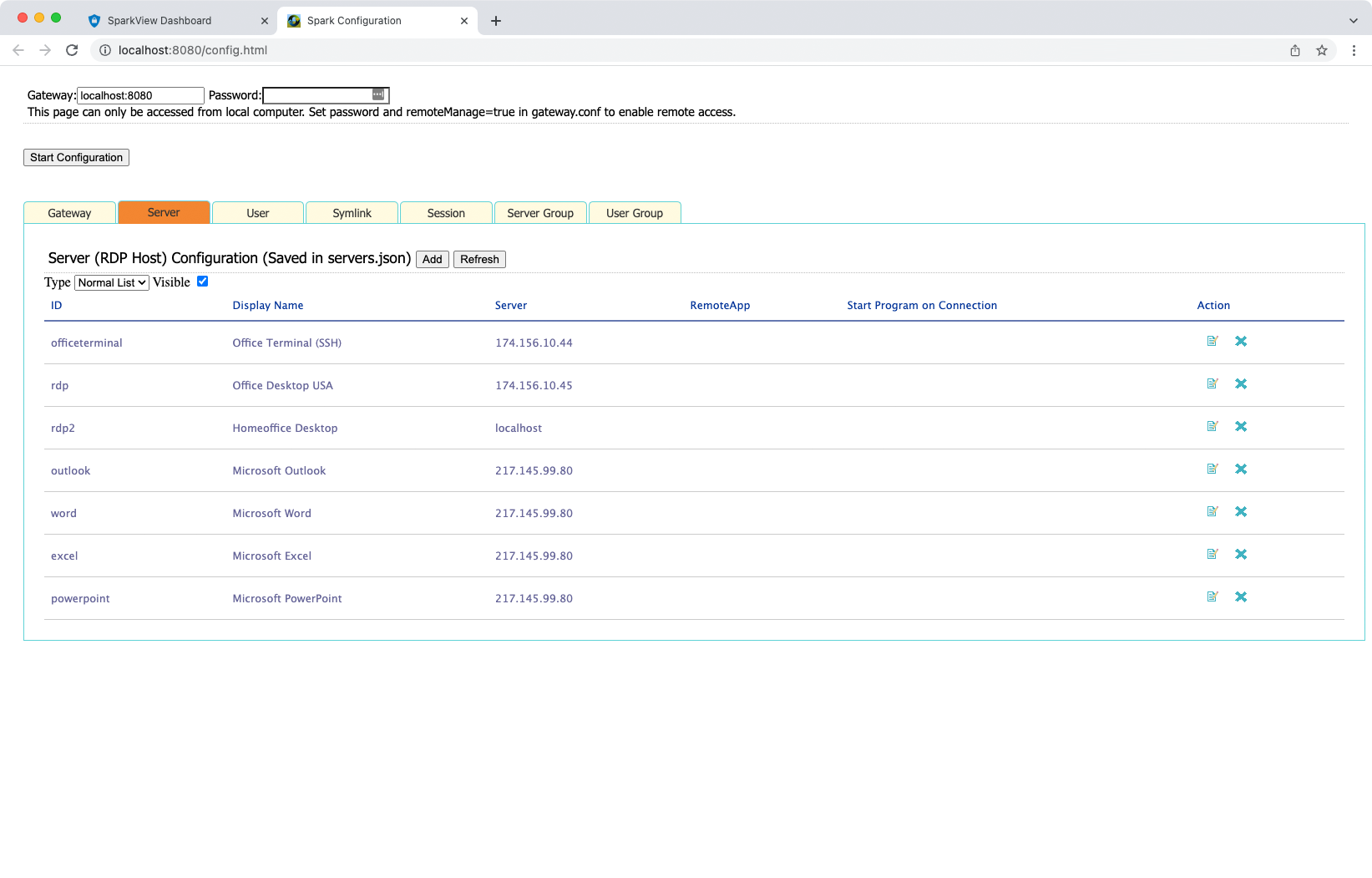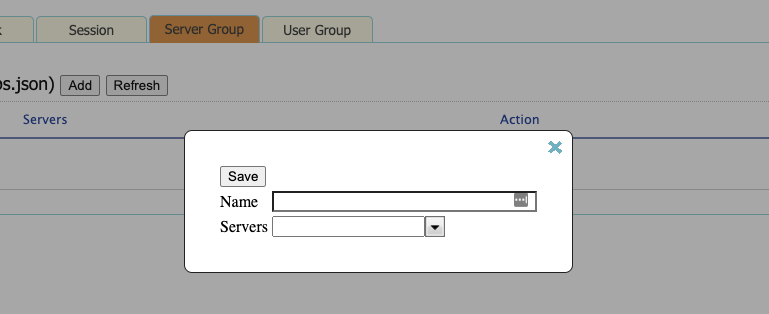3.4 – RDP, VNC, SSH, Telnet hosts
You can use servers.json file to configure: RDP hosts which can be accessed; RDP options for every host. The user can get a list of the RDP hosts if this file was used.
Here is an example:
{
/* this is a comment, use UTF-8 (without byte order mark) encoding for Unicode support */
"type": "NORMALLIST",
/* type can be WHITELIST, BLACKLIST, NORMALLIST */
"display": true,
/* display this list to client */
"connections": [
{
"id": "Word",
"displayName": "RemoteApp MS Word",
"server": "213.180.85.124",
"icon": "kbd.png",
"protocols": "rdp",
"rdp": {
"username": "demo",
"password": "m9ff.QWE",
"domain": "SERVERSKY",
"remoteProgram": "||WINWORD",
"mapClipboard": true,
"mapDisk": true,
"playSound": 0,
"mapPrinter": true
}
}
]
}
This file is in JSON format, {} means an object, [] means an array.
For a fullcomplete list of RDP optionsoptions, youplease can use (All options defined in this file will override the client options):
You can also define IP ranges in servers.json, for example:
{
"id": "range1",
"ipRanges": [
{"from": "192.168.0.0", "to": "192.168.0.250"},
{"from": "192.168.56.0", "to": "192.168.56.250"}
]
},
You can also use config.html to configure servers.json. Use your browser navigate to:
http://localhost/config.html.
For security reason, this page can be only accessed from local host.
You can also configure server groups, which is saved in serverGroups.json by default:
Keyboard layouts:
| Id | Name |
|---|---|
| 0x00000401 | Arabic (101) |
| 0x00000402 | Bulgarian |
| 0x00000404 | Chinese (Traditional) - US Keyboard |
| 0x00000405 | Czech |
| 0x00000406 | Danish |
| 0x00000407 | German |
| 0x00000408 | Greek |
| 0x00000409 | US |
| 0x0000040A | Spanish |
| 0x0000040B | Finnish |
| 0x0000040C | French |
| 0x0000040D | Hebrew |
| 0x0000040E | Hungarian |
| 0x0000040F | Icelandic |
| 0x00000410 | Italian |
| 0x00000411 | Japanese |
| 0x00000412 | Korean |
| 0x00000413 | Dutch |
| 0x00000414 | Norwegian |
| 0x00000415 | Polish (Programmers) |
| 0x00000416 | Portuguese (Brazilian ABNT) |
| 0x00000418 | Romanian |
| 0x00000419 | Russian |
| 0x0000041A | Croatian |
| 0x0000041B | Slovak |
| 0x0000041C | Albanian |
| 0x0000041D | Swedish |
| 0x0000041E | Thai Kedmanee |
| 0x0000041F | Turkish Q |
| 0x00000420 | Urdu |
| 0x00000422 | Ukrainian |
| 0x00000423 | Belarusian |
| 0x00000424 | Slovenian |
| 0x00000425 | Estonian |
| 0x00000426 | Latvian |
| 0x00000427 | Lithuanian IBM |
| 0x00000429 | Farsi |
| 0x0000042A | Vietnamese |
| 0x0000042B | Armenian Eastern |
| 0x0000042C | Azeri Latin |
| 0x0000042F | FYRO Macedonian |
| 0x00000437 | Georgian |
| 0x00000438 | Faeroese |
| 0x00000439 | Devanagari - INSCRIPT |
| 0x0000043A | Maltese 47-key |
| 0x0000043B | Norwegian with Sami |
| 0x0000043F | Kazakh |
| 0x00000440 | Kyrgyz Cyrillic |
| 0x00000444 | Tatar |
| 0x00000445 | Bengali |
| 0x00000446 | Punjabi |
| 0x00000447 | Gujarati |
| 0x00000449 | Tamil |
| 0x0000044A | Telugu |
| 0x0000044B | Kannada |
| 0x0000044C | Malayalam |
| 0x0000044E | Marathi |
| 0x00000450 | Mongolian Cyrillic |
| 0x00000452 | United Kingdom Extended |
| 0x0000045A | Syriac |
| 0x00000461 | Nepali |
| 0x00000463 | Pashto |
| 0x00000465 | Divehi Phonetic |
| 0x0000046E | Luxembourgish |
| 0x00000481 | Maori |
| 0x00000804 | Chinese (Simplified) - US Keyboard |
| 0x00000807 | Swiss German |
| 0x00000809 | United Kingdom |
| 0x0000080A | Latin American |
| 0x0000080C | Belgian French |
| 0x00000813 | Belgian (Period) |
| 0x00000816 | Portuguese |
| 0x0000081A | Serbian (Latin) |
| 0x0000082C | Azeri Cyrillic |
| 0x0000083B | Swedish with Sami |
| 0x00000843 | Uzbek Cyrillic |
| 0x0000085D | Inuktitut Latin |
| 0x00000C0C | Canadian French (legacy) |
| 0x00000C1A | Serbian (Cyrillic) |
| 0x00001009 | Canadian French |
| 0x0000100C | Swiss French |
| 0x0000141A | Bosnian |
| 0x00001809 | Irish |
| 0x0000201A | Bosnian Cyrillic |
Keyboard layout variants:
| Id | Name |
|---|---|
| 0x00010401 | Arabic (102) |
| 0x00010402 | Bulgarian (Latin) |
| 0x00010405 | Czech (QWERTY) |
| 0x00010407 | German (IBM) |
| 0x00010408 | Greek (220) |
| 0x00010409 | United States-Dvorak |
| 0x0001040A | Spanish Variation |
| 0x0001040E | Hungarian 101-key |
| 0x00010410 | Italian (142) |
| 0x00010415 | Polish (214) |
| 0x00010416 | Portuguese (Brazilian ABNT2) |
| 0x00010419 | Russian (Typewriter) |
| 0x0001041B | Slovak (QWERTY) |
| 0x0001041E | Thai Pattachote |
| 0x0001041F | Turkish F |
| 0x00010426 | Latvian (QWERTY) |
| 0x00010427 | Lithuanian |
| 0x0001042B | Armenian Western |
| 0x00010439 | Hindi Traditional |
| 0x0001043A | Maltese 48-key |
| 0x0001043B | Sami Extended Norway |
| 0x00010445 | Bengali (Inscript) |
| 0x0001045A | Syriac Phonetic |
| 0x00010465 | Divehi Typewriter |
| 0x0001080C | Belgian (Comma) |
| 0x0001083B | Finnish with Sami |
| 0x00011009 | Canadian Multilingual Standard |
| 0x00011809 | Gaelic |
| 0x00020401 | Arabic (102) AZERTY |
| 0x00020405 | Czech Programmers |
| 0x00020408 | Greek (319) |
| 0x00020409 | United States-International |
| 0x0002041E | Thai Kedmanee (non-ShiftLock) |
| 0x0002083B | Sami Extended Finland-Sweden |
| 0x00030408 | Greek (220) Latin |
| 0x00030409 | United States-Dvorak for left hand |
| 0x0003041E | Thai Pattachote (non-ShiftLock) |
| 0x00040408 | Greek (319) Latin |
| 0x00040409 | United States-Dvorak for right hand |
| 0x00050408 | Greek Latin |
| 0x00050409 | US English Table for IBM Arabic 238_L |
| 0x00060408 | Greek Polytonic |
| 0xB0000407 | German Neo |
Keyboard Input Method Editors (IMEs):
| Id | Name |
|---|---|
| 0xE0010404 | Chinese (Traditional) - Phonetic |
| 0xE0010411 | Japanese Input System (MS-IME2002) |
| 0xE0010412 | Korean Input System (IME 2000) |
| 0xE0010804 | Chinese (Simplified) - QuanPin |
| 0xE0020404 | Chinese (Traditional) - ChangJie |
| 0xE0020804 | Chinese (Simplified) - ShuangPin |
| 0xE0030404 | Chinese (Traditional) - Quick |
| 0xE0030804 | Chinese (Simplified) - ZhengMa |
| 0xE0040404 | Chinese (Traditional) - Big5 Code |
| 0xE0050404 | Chinese (Traditional) - Array |
| 0xE0050804 | Chinese (Simplified) - NeiMa |
| 0xE0060404 | Chinese (Traditional) - DaYi |
| 0xE0070404 | Chinese (Traditional) - Unicode |
| 0xE0080404 | Chinese (Traditional) - New Phonetic |
| 0xE0090404 | Chinese (Traditional) - New ChangJie |
| 0xE00E0804 | Chinese (Traditional) - Microsoft Pinyin IME 3.0 |
| 0xE00F0404 | Chinese (Traditional) - Alphanumeric |



